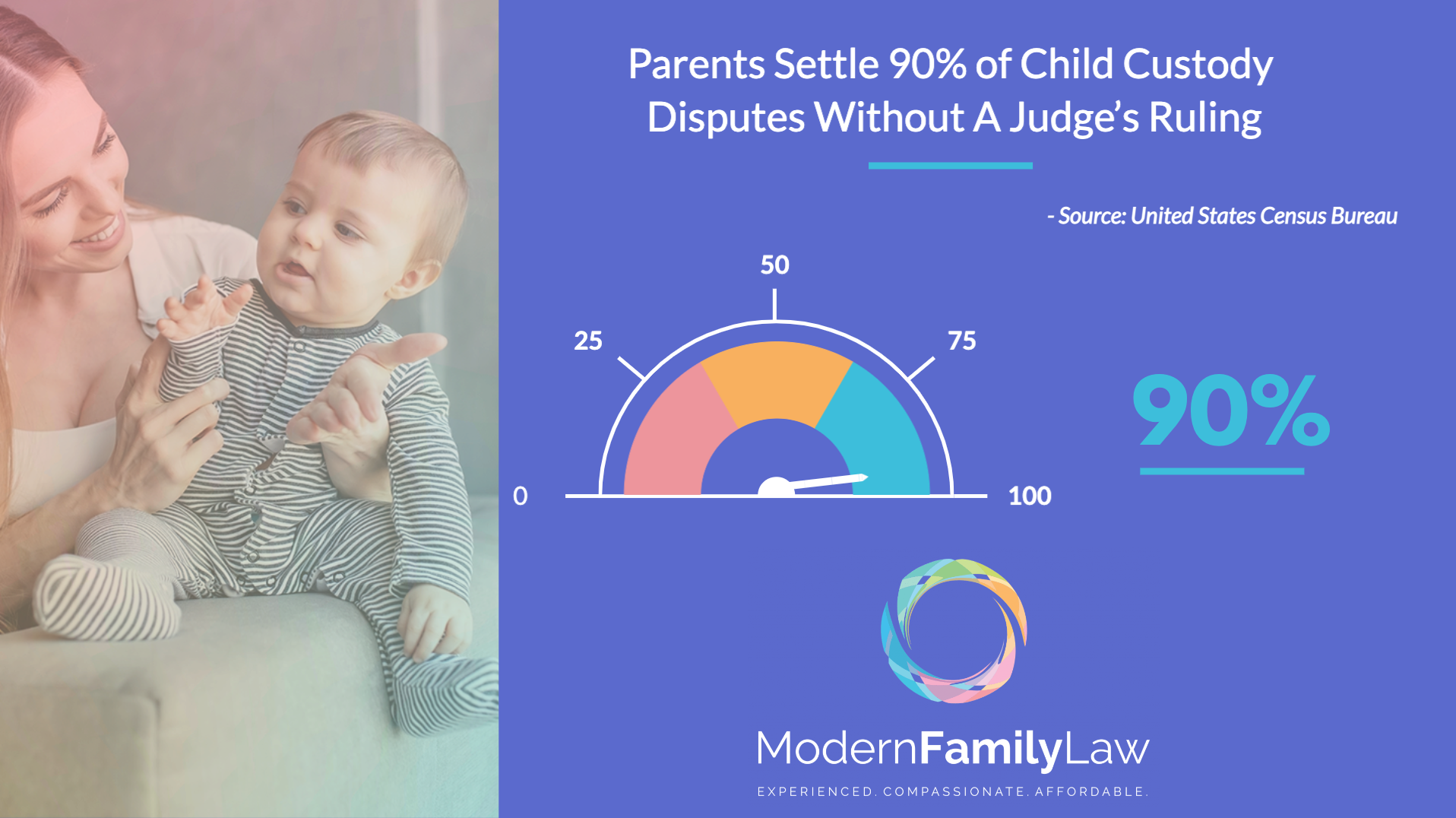CHILD CUSTODY ARRANGEMENTS
IN COLORADO
Child custody arrangements in Colorado determine the legal responsibility and physical care of minor children. The state follows a "best interests of the child" standard in making custody decisions. This means that the court will consider various factors, such as the child's relationship with each parent and any history of abuse or neglect, to determine the arrangement that will provide the most stability and security for the child.
Modern Family Law's child custody lawyers specialize in helping parents navigate the legal process of determining child custody arrangements. Our compassionate lawyers provide legal representation and guidance to clients throughout the custody process, from negotiating an agreement to advocating for their client's rights and interests in court. They are knowledgeable about Colorado's custody laws and regulations, and can help clients understand their rights and options.. Learn about Colorado child custody arrangements below including:

Our experienced Colorado child custody attorneys provide valuable advice and guidance to all of their clients. By working with our skilled Colorado custody lawyers, parents can ensure that their case is handled in a fair and efficient manner and that their child's best interests are protected. Navigating a custody case is never easy, let the compassionate custody attorneys of Modern Family Law guide you through through the process and ensure the best future for you and your child(ren).
WHAT TYPES OF CUSTODY ARRANGEMENTS
ARE AVAILABLE IN COLORADO?
In Colorado, the courts now use the term "Parental Responsibility" when referring to child custody arrangements. The Allocation of Parental Responsibilities (APR) is a legal process to determine parental rights and responsibilities, replacing the traditional terms of child custody and visitation. Parental Responsibility consists of two parts: Parenting Time (physical custody) and Decision-Making (legal custody). Furthermore, parenting time and decision-making can be joint (shared between parents) or primary ( falling solely on one parent).
Decision-Making
Legal decision-making refers to the authority to make choices about a child's upbringing, including choices about education, religion, and medical care.
Joint Decision-Making

Joint decision-making in Colorado is a type of custody arrangement where both parents have an equal say in making important decisions about a child's upbringing, such as education, religion, and medical treatment.
Sole Decision-Making

In Colorado, sole decision making refers to a parenting arrangement where one parent has the right to make major decisions about a child's upbringing, such as those related to education, health, and religion, without consultation or agreement from the other parent.
Parenting Time
Parenting time in Colorado refers to a parents responsibility to house and care for a child.
Joint Parenting Time

Joint parenting time in Colorado is a custody arrangement where the child lives with each parent for at least 25% of the time.
Primary Parenting Time

Primary parenting time in Colorado is a custody arrangement where the child lives with one parent more than 75% of the time.
WHAT ARE THE FACTORS FOR DECIDING
PARENTAL RESPONSIBILITIES IN COLORADO?
In Colorado, the court considers various factors when determining parental responsibilities. The courts in Colorado consider the following factors when determining parenting time allocation to suit the child's best interest:
- The parents’ expressed wishes
- The child’s wishes (if mature enough to express informed preferences)
- The child’s adjustment to home, school, and community
- The child’s relationship with parents, siblings, and other important individuals
- The parties’ mutual support, time commitment, and shared values
- The mental and physical health of all involved individuals (disability not a restriction)
- The ability of all to encourage affection, love, and contact between the child and the other party
- The physical proximity of parties to each other
- Past instances of child abuse or neglect by either party
- Past instances of spousal abuse by either party
- The ability of each party to prioritize the child’s needs over their own.

The factors the court uses for awarding decision-making responsibilities are similar to those for parenting time. When deciding how major decisions for the child will be made, the courts consider:
- The ability of the parents to work together and make joint decisions
- The existence of a supportive and committed relationship between the parents and child
- Whether joint decision-making would encourage more frequent and sustained contact between the child and each parent
- Any history of child abuse or neglect by either parent
- Any history of spousal abuse by either parent.
WHAT IS A MOTION TO MODIFY
ALLOCATION OF PARENTAL RESPONSIBILITIES?

In Colorado, an allocation of parental responsibilites order can be altered by petitioning the court, provided that the modification serves the best interests of the child. However, the judge is unlikely to make significant changes to parenting time or the primary residency of the child, unless there are new circumstances not previously known to the judge that impact the best interests of the child. Evidence of abuse, specific criminal convictions, or domestic violence are typically considered as new factors or changes in circumstances that would warrant a modification to the allocation of parental responsibilities.
Learn more about: Custody Modification in Colorado
WHAT OUR CLIENTS SAY ABOUT OUR
EXPERIENCED CHILD CUSTODY LAWYERS IN COLORADO
FREQUENTLY ASKED QUESTIONS ABOUT
CUSTODY ARRANGEMENTS IN COLORADO
Is Colorado A 50/50 Child Custody State?
In Colorado, family courts are not bound by a requirement for equal parenting time. Instead, the law prioritizes continuing and frequent contact between children and their parents. While equal time may be feasible in some cases, such as a week-on, week-off schedule, or split summers, it’s not mandatory. Learn more about the court’s decisions on equal parenting time in Colorado.
Is There A Preferred Custody Arrangement In Colorado?
In Colorado, the involvement of both parents in child-rearing is strongly encouraged. Courts generally prioritize continuous and significant contact between the child and each parent, unless it poses a threat to their physical or emotional well-being. It is thus advisable for parents to work towards amicable co-parenting, involving child transfer, holiday and event coordination, and a willingness to adjust plans as necessary. When granting joint custody, the court takes into account the relationship between the parents, so a hostile or negative attitude towards co-parenting or speaking ill of the other parent in front of the child may not be favored by the court.
What Are The Two Ways The Court Allocates Parental Responsibilities?
A court may allocate parental responsibility in a child custody case through either an evidentiary hearing to establish the child’s best interests or by endorsing a mutually agreed upon parenting plan. The latter option is preferred, as it allows the parents to create a more adaptable and practical plan, rather than being subjected to a court-imposed order with limited involvement and cooperation.
OUR COLORADO CHILD CUSTODY LOCATIONS
COLORADO SPRINGS
CHILD CUSTODY LAWYERS
9362 Grand Cordera Pkwy Suite 205,
Colorado Springs, CO 80924
FORT COLLINS
CHILD CUSTODY LAWYERS
3711 John F Kennedy Pkwy Suite 225,
Fort Collins, CO 80525
(970) 410-8241
OUR COLORADO FAMILY LAWYERS
ARE READY TO LISTEN!
Our experienced child custody attorneys in Colorado
work to secure the best outcome for you and your children.
Reach out today to and let our experienced attorneys stand up for you!
Schedule A FREE
Consultation
